Abe's three shots at pacifism
Updated: 2013-12-18 08:17
(China Daily)
|
||||||||
It is hardly cheering news that a country whose leaders still salute war criminals has formally launched its military reconstruction.
Approving Japan's security strategy, defense program guidelines and mid-term defense program on Tuesday, the Cabinet of Japanese Prime Minister Shinzo Abe officially mandated his doctrine of "proactive pacifism", which heralds a new round of Japan's military buildup.
Serving as a guideline for Japan's foreign and defense policies, the first national security strategy sets Japan on a course toward greater involvement in military-related matters, with reduced emphasis on diplomacy.
Based on the national security strategy, Japan's national defense program guidelines and mid-term defense program show a Japanese army that will be beefed up in the coming decade.
If this is what Abe's "proactive pacifism" is about, he is steering his country along a dangerous path.
It spells a radical break with Japan's post-World War II tradition of keeping a distance from international conflicts and trying to build peace through nonmilitary means, which has earned Japan the trust of the international community. Pacifism is one of postwar Japan's central values many Japanese have accepted.
Abe's "proactive pacifism" doctrine is essentially turning Japanese self-defense forces into "ordinary armed forces".
Since coming into power in December 2012, Abe's government has openly criticized China, toughened its stance on Japan's territorial dispute with China, boosted military spending and taken steps to free the country's military from the constraints imposed by the Japanese Constitution.
The revision of the guidelines for the Japan-US defense cooperation, which is due next year, will formalize "robust" new military arrangements between the two countries and facilitate Abe's plan to build "a strong military".
It is worthwhile noting that this advocate of the doctrine of "proactive pacifism" is a historical revisionist who minimizes or ignores Japan's wartime atrocities.
He succeeded in having his doctrine incorporated into the joint statement the Japan-ASEAN summit issued on Saturday.
In doing so, he asked the Southeast Asian nations to take sides with Japan to contain China. He has been planting seeds of distrust and even hatred in Southeast Asia, driving a wedge between the region and China.
If this is part of his "proactive pacifism" doctrine, it will invite confrontation rather than make peace.
The catchy but vague expression "proactive pacifism" is Abe's camouflage to woo international understanding of Japan's move to become a military power.
(China Daily 12/18/2013 page8)
 Russia to bail out Ukraine for $15 billion
Russia to bail out Ukraine for $15 billion
 Fatal tiger attack 'points to flaws in zoo management'
Fatal tiger attack 'points to flaws in zoo management'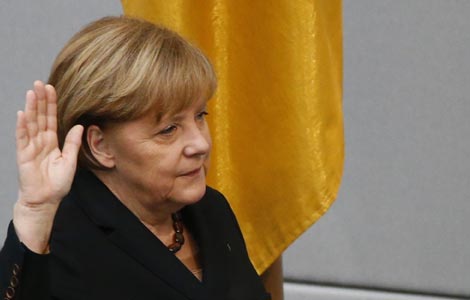
 Merkel sworn in as chancellor for a third term
Merkel sworn in as chancellor for a third term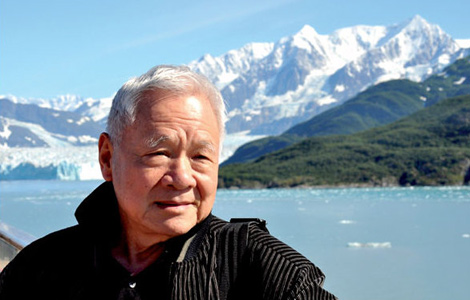
 Life in poetry
Life in poetry
 US first lady visits children in medical center
US first lady visits children in medical center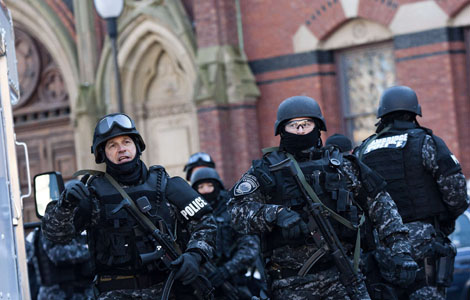
 Harvard reopens after bomb scare
Harvard reopens after bomb scare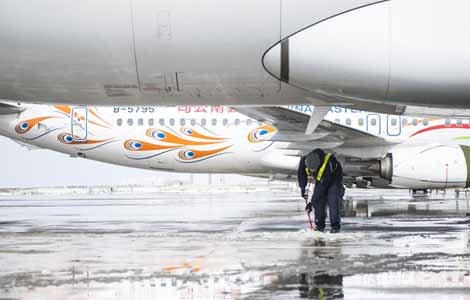
 Snowstorms cause chaos for travelers in Yunnan
Snowstorms cause chaos for travelers in Yunnan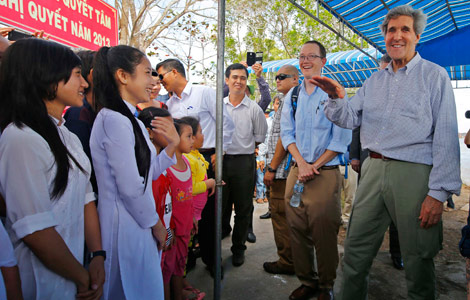
 Kerry offers Hanoi aid in maritime dispute
Kerry offers Hanoi aid in maritime dispute
Most Viewed
Editor's Picks

|

|

|

|

|

|
Today's Top News
Vast deposits of 'flammable ice' found
Russia to bail out Ukraine for $15 billion
System for organ donors test
Luxury market cooling down
Court to issue guide on private loan cases
US budget deal clears crucial vote in Senate
Japan seeks bigger role for military
Hukou reforms target 2020: official
US Weekly

|

|







